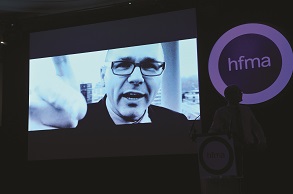Comment / All together now!
As the English health system moves further away from competition and philosophically closer to the integrated models employed by the three devolved nations, the indications are that we have arguably just pulled off the biggest collaboration of all.
It looks as though 2016/17 provider deficits have been dampened by sustainability and transformation fund income and offset with the reserve protected by commissioners. And achieving this overarching ‘system control total’ is in the end what counts. All focus has now switched to 2017/18, and repeating aggregate financial delivery within the total allocation will be another colossal challenge.

Meanwhile, we have a UK government with a weakened mandate and a single parliamentary focus for the next two years on exiting the EU in the best possible shape. No-one would expect either an NHS revenue funding injection or a meaningfully concluded public debate ahead of Brexit on the future of health and social care. As one commentator suggested, we will remain in the ‘sleeves rolled up’ period for the foreseeable future.
Dorset has taken huge steps towards collaboration, including all five NHS parties (commissioner and four providers) agreeing to share financial risk from April 2017. There isn’t any magic bullet behind our agreement – after all, there’s no more money. In our case a single county-wide clinical commissioning group with a flat allocation settlement was only ever going to mean flat cash for planned flat activity, translating into flat workforce at best.
If delivered, this at least puts us on trajectory for an agreed five-year system transformation plan.
The current year efficiency ask that falls out of this approaches 5% – slightly ahead of the average indicated by responses to the HFMA’s latest NHS financial temperature check. We have a monthly governance system to ensure all parties, individually and collectively, are doing what they said they would do.
Only time will tell if this approach works for Dorset, but the mind-set change is tangible, with all five finance leaders and colleagues modelling the future.
I write this column having spent some time at the US HFMA ANI conference. While there, we shared experiences with our global HFMA partners, including chief finance officers from some of the most renowned US healthcare bodies and Australian health systems.
Strip away the different funding mechanisms and it’s clear we all face the same issues, from Kaiser Permanente to Gold Coast Health. We are all focused on maintaining the prevailing health ‘offer’ in light of funding and efficiency expectations. We all face the challenges posed by demographic population growth, rising user expectations and workforce recruitment, development and retention challenges.
All the CFOs saw collaboration, not competition, as the answer to improving value. This was underlined by the theme of this year’s HFMA US conference ‘Collaborating for the future’ – a bold statement in a health system built on fee for service.
Back at home, the first real indication of Dorset’s position will come from the analysis of finance and performance results at the end of Q1. What is the story behind our leading numbers for I&E run-rate, the A&E four-hour standard (with associated STF income link) and cash? That will help us build out our 2018/19 opening position and compare with the original plan. Then we can adjust our organisational focus to set efficiency plans for next year, while dealing with any under-delivery in this year.
This is a path well trodden by all of us. But let’s not take for granted the leadership role we play in maintaining this momentum. My time with US and Australian colleagues reminded me that while these are among the toughest leadership roles, they are often also the most rewarding. And in the words of the incoming HFMA US chair ‘where passion meets purpose’ – that’s where the magic happens.
Contact the president on [email protected]
Related content
We are excited to bring you a fun packed Eastern Branch Conference in 2025 over three days.
This event is for those that will benefit from an overview of costing in the NHS or those new to costing and will cover why we cost and the processes.